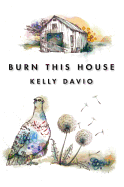
Kelly Davio's debut poetry collection, Burn This House, smolders with doubt and misdirection. Cosmic yet controlled, her poetry recalls Faulkner's Barn Burning, in which a son struggles against the crushing yet slippery burden of familial allegiance. Divided into five subsections that cycle from "Signs" through to "Judgment," Davio's poetry vibrates with ambiguity. In "Burned by Salt," Davio describes how a mother's sharp blow to a child's chest as she "braked for a red too quickly" could be protective instinct, or "from a darker place." In "Senescence," Cain, who is "no young man, [but] aged as first fathers are said to have lived," kills his brother not from "a lone flush of rage," but from years toiling in soil gouged by ravens and tracked by "worms that waited centuries for flesh." In "Chastity," Davio, like a Greek chorus, exposes the cruelty of Providence:
"The next Christmas, death came wrapped/ as a package, bowed with mangled steel."
Embracing paradox as the poet's deliverance, Davio evokes Wallace Stevens's "The Emperor of Ice Cream":
"Trace with bones
your semblance in the ash, and let darkness
surround, sloughing off the body's burden."
At the same time, Davio's yearning for transcendence is grounded in her physical self. In "Gammelfleish," a cook's preparation of a stock pot symbolizes a poet's craft:
"Brown seeps from leaves,
bittering the stew, its odor like a small death
I wait for the slow color to spread,
for garlic tips to lose rough husks
with incremental heat at the pot, for
the alchemical swell of yellow to come." --Thuy Dinh, editor, Da Mau magazine

